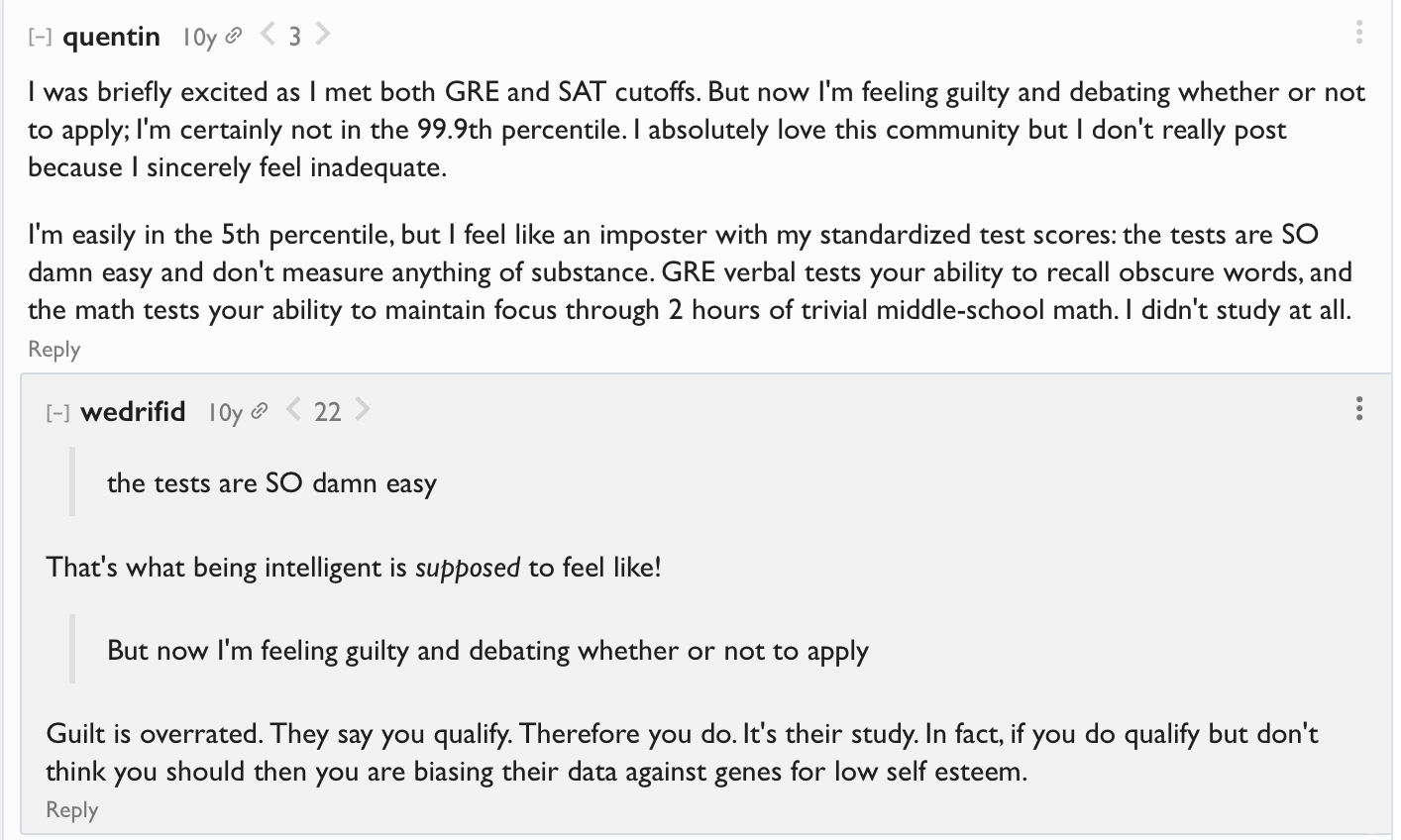Irrational Modesty
post by Tomás B. (Bjartur Tómas) · 2021-06-20T19:38:25.320Z · LW · GW · 6 commentsContents
7 comments
At an online meetup I attended, I talked to a fellow who was working on some software that he thought would be useful for aggregating information for Effective Altruists. He said he would like to work on it full time this summer rather than get an internship - but that this was not financially feasible.
His idea seemed not-obviously stupid and I suggested he apply for a LTFF or EAIF grant. He said he did not want to as he was worried the money could go to better use.
I asked him if he thought the grant-makers were in a better position than him to decide if his project would be an efficient use of their capital. He said he did. I then asked him if he thought his idea was so likely to be a waste of time that even reading his proposal would be net negative in expectation; he said, "No".
He is now working on his proposal.
Here we have an example of someone who is likely much smarter than me but was unable to think clearly due to irrational modesty. I am worried this may be true of some extremely capable people, and how tragic it would be if this is the case.
The vast majority lack the requisite ability to do alignment research. I have a good model of my talents and capabilities, and I am certain I do not. In truth, it is not even close. Those who are capable, confident in their abilities, and motivated to work on this problem do not need a peptalk. But the possibility that there is a class of highly-talented would-be-motivated people who lack confidence in their abilities still haunts me.
I am reminded of this humorous exchange:

Though quentin's blindness to his own intelligence is humorous, it is a mistake and a rather large one. Irrational modesty is every bit as bad as overconfidence, possibly more so.
In the event anyone reading this has objective, reliable external metrics of extremely-high ability yet despite this feels unworthy of exploring the possibility that they can contribute directly to research, my advice is to act as if these external metrics correctly assess your ability until you have thoroughly proven to yourself otherwise.
There is no virtue in clutching Kryptonite. I advise you to drop it and see how far you can fly.
6 comments
Comments sorted by top scores.
comment by Insub · 2021-06-21T03:08:16.291Z · LW(p) · GW(p)
In the event anyone reading this has objective, reliable external metrics of extremely-high ability yet despite this feels unworthy of exploring the possibility that they can contribute directly to research
Huh, that really resonates with me. Thanks for this advice.
Replies from: neel-nanda-1↑ comment by Neel Nanda (neel-nanda-1) · 2021-06-24T10:11:14.830Z · LW(p) · GW(p)
Seconded, that line really hit home for me
comment by chaosmage · 2021-06-21T12:28:24.548Z · LW(p) · GW(p)
I'd go as far as to say justified pride and status-seeking is actually a virtue and a moral duty!
Why? Because status is a signal: high status people are worth imitating. That isn't all status is, but it is a very central benefit that justifies its existence. If you are really successful, and you're hiding that, you're refusing to share valuable information. They might want to check what you're dong right, and imitate that, hopefully becoming more sucessful themselves.
And why would you refuse to seek justified status? I see only three reasons.
- Fear of embarassment when you reach too high.
- Deliberate deception in order to benefit from asymmetric information.
- Outmoded cultural traditions from back when it was hard to check someone else's work and see whether it is actually that good.
I don't think any of these are good reasons.
Replies from: sil-ver, ChristianKl↑ comment by Rafael Harth (sil-ver) · 2021-06-23T14:01:32.263Z · LW(p) · GW(p)
And why would you refuse to seek justified status?
One reason would be that seeking status will lead to you having less of it, which I strongly think is true insofar as 'seeking' means 'having it as the driving motivation'. Think about how many of the high-status people in the rationalist sphere are relatively status-blind. If we draw from fiction, note that this is true for Harry in hpmor, too.
It's also not always true that high status people are worth imitiating or listening to, but I would agree if you just meant on average.
↑ comment by ChristianKl · 2021-06-23T14:18:17.148Z · LW(p) · GW(p)
When I write a post the post will be different when it's written to seeking truth then when it's written to seek truth and seek justified status. While often both goals are alligned there are times when they are not aligned and one has to make a decision.
It's even worse because given the way the human mind works those decisions are often made without thinking about them in favor of status as evolution primed us to seek status.
To not have your desire to seek status disturb your ability to hold accurate beliefs about the world it's necessary to partly ignore status seeking impulses.
When thinking about writing a grant application it's important to convey justified status. When writing an analysis of a topic it's less important.
Replies from: chaosmage